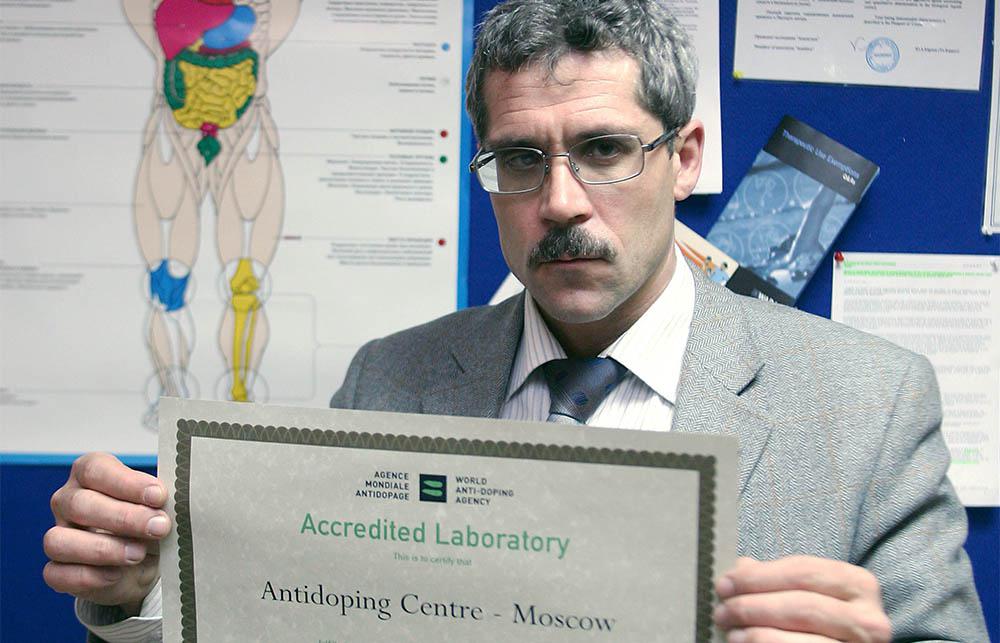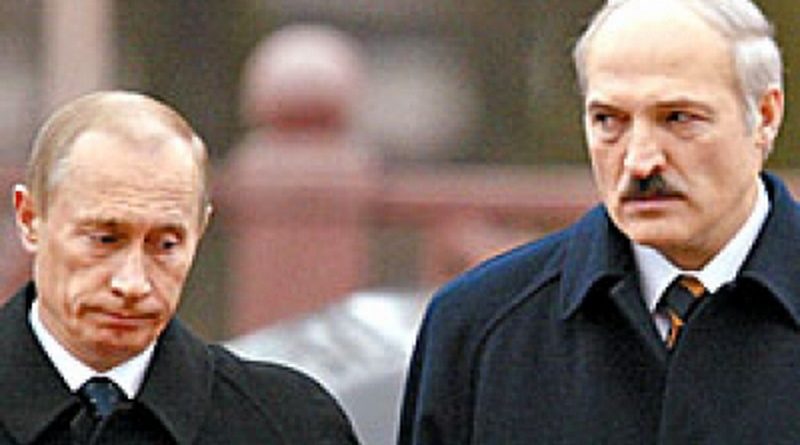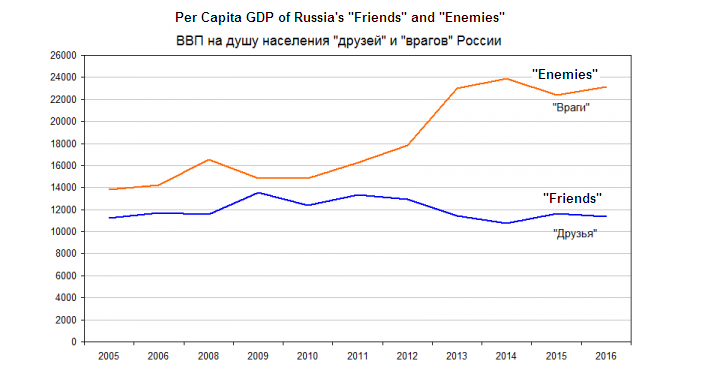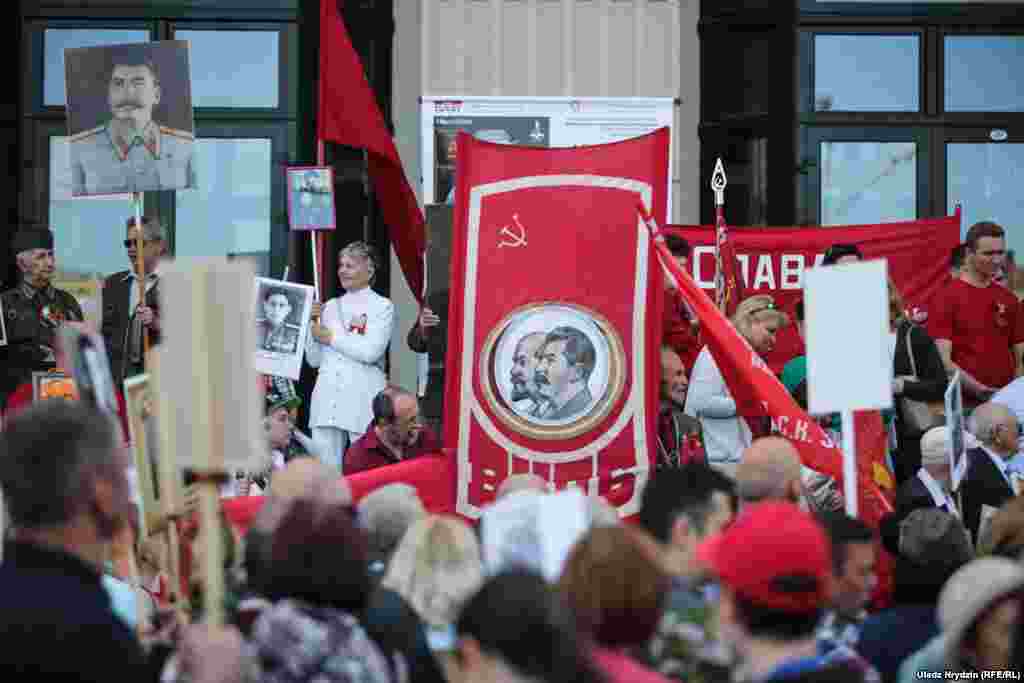The flood of news stories from a country as large, diverse and strange as the Russian Federation often appears to be is far too large for anyone to keep up with. But there needs to be a way to mark those which can’t be discussed in detail but which are too indicative of broader developments to ignore.
Consequently, Windows on Eurasia each week presents a selection of these other and typically neglected stories at the end of each week. This is the 108th such compilation, and it is again a double issue with 26 from Russia and 13 from Russia’s neighbors. Even then, it is far from complete, but perhaps one or more of these stories will prove of broader interest.
1. Putin Stands Taller – as a Statue – and Alienates Even His Allies with Lying
Vladimir Putin has always been sensitive about his height, and the Russian media have gone to great lengths to make him appear taller than he really is. Now a new statue in Chelyabinsk, supposedly life size, makes him 10 centimeters (four inches) taller than in reality (agonia-ru.com).
Another story reports that Putin’s lying has become so over the top that it is even raising eyebrows among those who are his closest supporters (ej.ru).
Putin made another series of comments last week that deserve mention:
- He charged that the West was collecting biological materials on Russians to create an ethnic weapon against them, a charge that has long been part of Russian conspiracy thinking but hasn’t been sanctioned before by a Kremlin leader (newsland.com, ruskline.ru and graniru.org).
- Putin also thanked God for defending Russia against meteorites (lenta.ru).
2. ‘Trump is No Longer Important for Moscow’
Russian commentators are suggesting that the US president is no longer the focus of their interest because he can’t deliver being bound “hand and foot” by the American establishment (republic.ru, regnum.ru, and iz.ru).
The Russian Duma is imposing new sanctions on American media in response to US requirements that RT register as a foreign agent in America (gazeta.ru) and has authorized the spending of three million rubles (50,000 US dollars) to see how counter-sanctions have affected Russians (politsovet.ru).
3. The Source of Russia’s Problems? The Americans Wrote Its Constitution
The presidentialist Russian constitution of 1993 that Vladimir Putin has exploited to create a dictatorship in Russia was written by Americans, as even the US government admits, Moscow media are now pointing out (newsland.com).
Other developments this week concerning the Russian political system included:
- A call for Putin to create a high caste of senior officials (newsland.com),
- The end of the once ubiquitous postal savings books in Russian post offices (lenta.ru),
- Moscow’s forcing of regions to freeze salaries at their level and then force municipalities to balance their budgets in an effort to hide responsibility for who is giving the orders (politsovet.ru, idelreal.org and regnum.ru),
- Putin’s call for citizens to exert more influence on organs of local power but of course not on him (newsland.com), and
- The best scandal of some time: the discovery of an eight million ruble (120,000 US dollar) toilet in the house of a senior official in the Far North (lenta.ru).
4. Milonov Identifies a New Russian Sin – Being Pro-American
Duma deputy Vitaly Mironov says that Kseniya Sobchak is guilty of a sin he has newly identified – being pro-American – and must be ostracized and defeated because of that (znak.com). Sobchak drew his fire for supporting US sanctions against Russia, promising to allow gay parades, and denying that Russian unity exists (newsland.com, newsland.com and echo.msk.ru).
Meanwhile, some in the Russian media are having fun with the fact that the leader of Putin’s as-yet-undeclared campaign is a dollar millionaire from the US (politsovet.ru). Alexei Navalny and Sobchak are now fighting over the same voters in the regions with the former worried about losing his supporters to the latter (ura.news). As expected, a Russian court has refused to accept even for a hearing Navalny’s suit against Putin (novayagazeta.ru). And many Russians appear to be tuning out the election as an unimportant freak show whose outcome is already well-known to all (lenta.ru). To the extent they are, Moscow is not gaining another distraction it hoped for now that the controversy over Mathilda has died down (polit.ru).
5. Russian Inequality Now Same as in 1905
Inequality among Russians in terms of wealth has now returned to the level it was at in 1905 (kommersant.ru), with class discrimination not only widespread but increasing in many spheres across the country (publizist.ru).
Other economic news this week included:
- Kudrin’s prediction that tight budgets will bring on a new and deeper recession (ng.ru),
- The cost of living is rising faster in the two capitals than anywhere else (forum-msk.org),
- Major Russian banks won’t operate in occupied Crimea lest they run afoul of Western sanctions (ru.krymr.com),
- Salt prices projected to jump (iz.ru),
- Moscow debtors protest by blocking streets (newsland.com),
- Unemployment again increased this past week (regnum.ru),
- The sanctions and counter-sanctions, which Putin predicted would help Russian agriculture, haven’t because of a lack of investment and excessive controls (ng.ru), and
- Experts concede that Russia has now returned to the raw materials exporter model of economic activity despite all the talk about diversification and the risks of relying on commodities alone (newsader.com).
6. No Voice, Little Loyalty, More Exit
The emigration of wealthy and educated Russians is accelerating and this flow is now including ever more prominent people. (For a list of some of the most notable who’ve left in the last 12 months, see snob.ru. Cf. newsland.com).
Other societal news of note:
- Animal cruelty remains widespread and largely unpunished (babr24.com),
- Gender inequality in Russia will be overcome in 128 years if things continue at their current rate (rus.azattyk.org),
- Higher education is becoming devalued in Russia with more people expected to have a degree regardless of what they have learned (chaskor.ru), and,
- In an indication that things are really tough: one family in the North Caucasus sold their child for 100,000 rubles (1400 US dollars) (fedpress.ru).
7. Russian Doctors Now Dying Earlier than Their Patients
An unexpected consequence of Putin’s much-ballyhooed health “optimization” program is that doctors are now being forced to work such long hours that they are in many cases dying before their patients do (novayagazeta.ru and siberiantimes.com).
Many in the regions can’t get any medical care, and people in Moscow can’t get treatment for psychological problems (osbalt.ru, rusmonitor.com and svpressa.ru).
Syphillis, hepatitis, and HIV are all increasing at rapid rates (versia.ru, and newsland.com).
Ever more people are suffering from smog, even as Putin asks environmental activists not to press their cases too hard (asiarussia.ru and ura.news).
Moscow has come up with a new way to suggest Russians are getting more not less medicine: producers are packing drugs in small containers with fewer tablets and Rosstat is now counting the packages without taking into account the change in the number of pills (versia.ru).
And while it is an anniversary that didn’t attract as much attention as the centenary of the Bolshevik coup, another anniversary should not be ignored: This month marks the 115th years since the introduction of the first sobering up station in Russia (newizv.ru).
8. Central Asian Gastarbeiters in Moscow Now Learning … English
Russian officials have long encouraged Central Asians working in Moscow and other major cities to learn Russian, but now some of these migrants are choosing to learn not Russian but English (fergananews.com).
Interior ministry officials acknowledge that migrant workers are committing fewer crimes but still blame them for a rise in ethnic tensions in Moscow (nazaccent.ru and migrant.ferghana.ru). One way some Russian cities have decided to reduce the threat of new tensions is to ban gastarbeiters from jobs like in fast food restaurants where they come into frequent contact with the locals (migrant.ferghana.ru).
Meanwhile, Moscow historians and propagandists are suggesting that the 1916 Central Asian revolt was really about the genocide of ethnic Russians there (regnum.ru), and Grozny continues to try to attract Russian tourists to Chechnya, claiming that “more than 100,000” have come so far this year (kavpolit.com).
9. Mixed Messages in Language Fight
Putin’s order that no one be compelled to study any language except Russian is sparking more controversy, mixed messages, and delays in scheduled meetings on ethnic questions (nazaccent.ru, nazaccent.ru, idelreal.org, bashinform.ru and turantoday.com). Increasingly, non-Russians are placing the blame for this effort on Sergey Kiriyenko of the presidential administration (business-gazeta.ru).
10. ‘Orthodox Extremism Doesn’t Exist,’ Duma Official Says
Aleksandr Shchipkov, an advisor to the Duma speaker. Says that “Orthodox extremism doesn’t exist,” an assertion that flies in the face of much evidence to the contrary but corresponds to what the Moscow Patriarchate wants to believe (interfax-.ru and politsovet.ru).
The Duma also moves forward with a bill that will allow the state to openly finance many Russian Orthodox Church activities (rusk.ru).
In other religious news:
- South Ossetia’s political leadership is pushing the church there to shift to the jurisdiction of the Moscow Patriarchate (ekhokavkaza.com).
- A US citizen was fined for religious activity in Primorsky kray (interfax.ru),
- A wave of arrests hits mosques in Daghestan (onkavkaz.com).
- A Rostov court refuses to return mosques to believers (openrussia.org),
- Haj prices are slated to rise dramatically next year (mkala.mk.ru), and
- Repression against Protestants increases (sclj.ru and ruskline.ru).
11. Putin Says Developing Far East a Priority – But of Other Regions Not So Much
Vladimir Putin says that developing the Russian Far East is a priority for the 21st century (profile.ru), but his actions elsewhere suggest that other regions can’t count even on what he is promising the Far East (freeural.org).
Other regional news this week included:
- Tatarstan is seeking a referendum on local elections (kommersant.ru),
- Kaliningrad reports that Russia has abandoned more roads there over the last 70 years than it has built (newsland.com),
- Regional portals are now laying out their specific political programs (freeural.org and freeural.org),
- Regionalist movements are worried that media attention to them is leading to arrests (freeingria.org and freeural.org, and
- Russia’s airlines work against regions by keeping it cheaper to fly to Moscow than to nearby cities (sibreal.org).
12. Despite Deteriorating Situation, Russians Said Not Yet Angry Enough for Political Protests
Boris Vishnevsky says that despite how bad things are, Russians are not yet angry enough to demonstrate against the government (znak.com). But there were more protests this week of various kinds:
- Chechen students complained about being forced to take part in pro-government demonstrations (kavkaz-uzel.eu),
- People in debt or suffering as a result of unpaid wages protested in various places across the country (newizv.ru, znak.com and kavkaz-uzel.eu) – although some debtors have come up with a new strategy not to pay what they owe, claiming they are Soviet citizens not Russian ones (newsland.com),
- Peoples of the North demonstrated against “corporation of monsters” as they call the Russian oil and gas companies (fedpress.ru),
- People protested against new toll roads (kavkaz-uzel.eu),
- Yekaterinburgers demonstrated against housing shortages (sobkorr.ru), and
- Muscovites protested trash site construction (kasparov.ru).
But again there was some evidence protests work: Putin told a governor to meet with people who were protesting (kommersant.ru), and the new head of Daghestan ordered problems on the border be solved after truckers protested (kavkaz-uzel.eu).
13. One Russian in 20 has Been Arrested on Drug Charges
More than seven million Russians have been arrested for illegal drug use or sales, and those convicted on such charges fill a significant portion of Russia’s penal institutions (narzur.ru and takiedela.ru).
More evidence has surfaced about the interpenetration of Russia’s criminal gangs and the security services (portal-credo.ru and spektr.press).
- Analysts report that snitching is on the rise in Russia as more things become criminalized (republic.ru, rbc.ru and kommersant.ru) with first conviction announced against someone who failed to turn in an acquaintance (onkavkaz.com),
- Authorities continue crackdown on Russian nationalists and Navalny supporters (newsland.com, spektr.press and novayagazeta.ru),
- Russian prosecutors use new tactic against groups they don’t approve of – keeping cases open so they can add charges and conduct more searches (kasparov.ru), and
- The Russian government has announced plans for a single registry of “bad parents” (kasparov.ru).
14. Russian Guard Focusing on Security Choke Points
The Russian Guard this week focused on the small area in which almost all Russian gas pipelines flow through. Any attack on them could, the Guard said, leave Russia without gas for itself let alone for export (newsru.com, znak.com and ura.news).
Other Russian security services reported finding terrorist cells at construction sites and large amount of explosives in the North Caucasus (islamsng.com, politikus.ru and onkavkaz.com).
- Police in Kaliningrad said they had disarmed an anti-tank mine at the airport there (meduza.io),
- Yekterinburg police dealt with an armed firefight (politsovet.ru),
- An SVR building burned in Moscow (kasparov.ru) as did a United Russia Party building (kasparov.ru),
- Evacuations continued across the country in response to bomb threats (kasparov.ru, regnum.ru and fedpress.ru),
- Activists said anyone can get alternative service if he knows the rules (takiedela.ru), and
- Radioactivity from an unknown source in the Russian Federation was tracked heading toward Europe (lenta.ru).
15. Russian Military in Worse Shape than Moscow has Admitted
The modernization of the Russian military is far behind what the Kremlin had claimed, new defense ministry reports find (ng.ru and regnum.ru).
The high command nonetheless said that new pay raises for soldiers will keep the military happy (rbc.ru and newsland.com).
In other foreign security news:
- A deadly explosion rocked a Russian base in the Transbaikal (kasparov.ru),
- Activists want the foreign ministry to publish pay details on diplomats as UN requires (newsland.com),
- Moscow increases its reserve to pay judgments against it by European Human Rights Court (sobkorr.ru),
- Russia has fallen behind China and India for second place in space race (newsland.com), and
- Putin calls for creating “international association of friends of Crimea” (newsland.com).
16. Mathilda Film Director Challenged to a Duel
In what may be one of the last acts of the Mathilda controversy, the film’s director has been challenged to a duel by one of its critics. Despite that the film continues to attract audiences across the Russian Federation and without the violence at theaters many had expected (newsland.com).
17. No Rest for the Wicked – in This Case, for Lenin
Despite calls by the Moscow Patriarchate to stop talking about burying the founder of the Soviet state for five to ten years (interfax-religion.ru), controversy continues with monarchists and others pressing their case against leaving his body in the mausoleum (newsland.com), and other opponents of Lenin attacking his still numerous statues (newsland.com).
18. Kremlin, Uncertain How to Mark 1917 Anniversary, Stays Mostly Quiet
Fearful of coming down on the wrong side or exacerbating tensions, the Russian leadership stayed mostly quiet on the centennial of the Bolshevik coup (novayagazeta.ru, newsland.com and rferl.org). Perhaps the biggest public demonstration on that date marked not the revolution itself but the 1941 military parade whose participants marched off to fight the Germans (stoletie.ru). But elsewhere, the monuments war continues:
- Orenburg erected a monument to combat losses in Syria (interfax.ru),
- A survey found that the smaller the village the more support there is for erecting statues to the most bloody rulers in Russian history (zebra-tv.ru),
- Stalin’s name and visage are appearing on ever more products (politsovet.ru),
- Complaints about and attacks on the Yeltsin Center are expanding (momenty.org and echo.msk.ru), and
- Activists have called for a referendum on the erection of a statue of Islam Karimov (fergananews.com).
19. Russians Stripped of More Medals as Doping Scandal Spreads
Ever more Russian athletes have lost medals or been banned from future competitions because of doping. Russian athletes acknowledge there was a state system of doping, but the Kremlin won’t (themoscowtimes.com). Instead, Vladimir Putin has suggested there is a conspiracy against Russia to keep it out of the Olympics and to harm his re-election chances (themoscowtimes.com and meduza.io).
Some Russian officials suggested Russia might not take part in the Olympics even if the IOC allows it to attend but rather organize its own “alternative” games in Moscow (svpressa.ru and versia.ru).
In other sports news:
- Officials were trying to find out where two billion rubles (30 million dollars) allocated for the Samara arena for next year’s FIFA World Cup had disappeared (versia.ru and themoscowtimes.com),
- Cities where that competition is scheduled are finding out about just how many dormitories will have to be emptied for visitors (newsland.com), and
- A Duma deputy has complained that Russia’s soccer uniforms have too much “Soviet” in them (lenta.ru).
20. Only One Russian in 16 Admits Having Ancestors on Both Sides of Russian Civil War
Only six percent of Russians say that they had ancestors who fought for the Reds and for the Whites, a reflection both of genealogical ignorance and fears that identifying with one or the other even now could land them in difficulties (rosbalt.ru).
21. ’The Revolutionaries Who Forgot to Ask the People’
Efforts by some Russian nationalists led by Vyacheslav Maltsev to provoke a new revolution on November 5 fizzled given a near total lack of interest among the Russian population and massive intervention by Moscow’s security agencies (newsland.com, profile.ru, polit.ru, ixtc.org, and vz.ru).
22. Russian Internet Advertising Revenues Pass Those of Russian TV for First Time
Advertisers seeking to reach the Russian population are now, for the first time ever, spending more on ads on the Runet than they are on all Russian television channels combined (rbc.ru/technology_and_media/09/11/2017/5a041f509a7947026c7e9e7e).
23. Abuses in Russian Prisons Increase but Moscow Works to Hide Them
Abuses in Russian prisons appear to be on the rise now that Moscow has not only banned most rights activists from visiting penal institutions but forced the leader of Sitting Russia, the most prominent Russian prisoners’ rights organization, to flee the country (profile.ru, echo.msk.ru, echo.msk.ru, kasparov.ru, kasparov.ru and regnum.ru).
24. Regional Differences in Russian Language Reflect Divergent Mythologies
Scholars report that Russians in different parts of the country speak different forms of Russian and say that this at least in part reflect differences in national and religious mythologies behind certain words (polit.ru).
25. ‘One of the Cossacks Was a Jew – Nothing Out of the Ordinary in That’
Many assume that all Cossacks are Orthodox, but in fact, many have been Buddhists, Muslims or even Jews, as a new study finds (facebook.com/avraham.shmulevich).
26. Moscow Plans to Create World-Class Wineries
The Russian authorities may not want to acknowledge global warming, but they are taking advantage of some of its positive consequences. Rising temperatures in parts of the country now mean that there is the possibility of establishing vineyards that may ultimately, if Russian claims are followed through, produce world-class wine (echo.msk.ru).
And 13 others from countries in Russia’s neighborhood:
1. Moscow Controls the Donbas 100 Percent, Volker Says
Kurt Volker, the US special representative for Ukraine, says that Moscow and no one else controls the territories of the “DNR” and “LNR” in the Donbas 100 percent, a statement that should end any discussion about the supposed autonomous actions of forces there (thinktanks.by).
2. Kyiv Finally Ends Arms Deals with Moscow
Despite the Russian invasion of Ukraine, the Kyiv government has not broken diplomatic ties with Moscow or even ended numerous commercial relationships officially. Now that is beginning to change with some Ukrainian deputies pressing for a break in diplomatic relations and the Ukrainian government itself ending commercial relations in the area of military equipment (newsland.com).
3. Ukrainian TV Ignores Crimea
Ukrainian television devotes only about two percent of its time to the situation in Crimea, about the same amount it did before the Russian Anschluss, thus effectively removing it from the mental maps of many Ukrainians (gordonua.com).
4. Ukrainians Extinguish Soviet Eternal Fire Monument with Cement
To the outrage of Russians, a group of Ukrainians have extinguished the eternal flame in Kyiv by pouting concrete over the monument to Soviet war dead (qha.com.ua). That was just one of the Ukrainian actions on the occasion of the centenary of the Russian revolution (newsland.com).
5. Crimea’s Population Decline Accelerating
Since the Russian Anschluss, Crimea’s population has been declining at an ever accelerating rate, and the Ukrainian peninsula may soon be the region within the claimed borders of the Russian Federation with the greatest demographic collapse of all (newsland.com).
6. Half of Local Ukrainian Deputies in Transcarpathia have Hungarian Passports
According to local officials, approximately half of all local deputies in Ukraine’s Transcarpathia have Hungarian passports, an indication of Budapest’s activism there (newsland.com).
7. Belarus before 1991 had Highest Per Capita Soviet Military Presence Anywhere
Minsk faces serious problems in overcoming the heritage of the Soviet military presence and Soviet military values on its territory. Before 1991, there were more Soviet military personnel per capita in that republic than in any other republic or country in the world (charter97.org), and dedovshchina, one of the biggest problems in the Soviet military, continues to be a threat to the Belarusian army which has been unable to root it out or even reduce its virulence (belaruspartisan.org).
8. Nearly 700 Kilometers of Streets in Belarus Still have Soviet Names
A study has found that 698 km of streets in Belarus still bear Soviet names (thinktanks.by).
Belarusians still have an enormous number of Lenin statues around the country (charter97.org/ru/news/2017/11/7/268411/), and they lag behind other post-Soviet states in learning foreign languages other than Russian (thinktanks.by).
9. Nearly Half of Belarusians Say They Work Hard to Avoid Having Contact with Officials
Forty-five percent of Belarusians say they do what they can to avoid having to interact with the government, an indication of the strategy they have adopted to cope with Lukashenka’s corruption and repression (thinktanks.by).
10. Estonia Arrests Another Russian Spy
Estonia has arrested another Russia illegal attempting to cross into its territory, keeping the Baltic state well in the lead internationally in taking such actions or at least taking credit for stopping this form of Russian subversion (news.err.ee).
11. New Uzbekistan President Calls for Central Asian Unity
The new president of Uzbekistan, Central Asia’s most populous country, is calling for the formation of a region-wide political and economic union, something that would represent yet another challenge to the CIS (turantoday.com).
12. Tajikistan Fires Imams Trained Abroad
In an effort to control the spread of radicalism among its people, Dushanbe has ordered that all imams who received training abroad be dismissed from their posts (news.tj). That action may prove counter-productive. Not only are there not enough domestically prepared people to take their place, but the dismissed imams are likely to form underground mosques that will in the nature of things be more radical than those the authorities have been able to monitor in the past.
13. Tajik Doctoral Candidates Must Defense Their Theses in Tajik … or in English
Tajikistan has taken another major step away from the Russian world by announcing that graduate students will now have to defend their work in Tajik or in English rather than in Russian as was the case up until now (fergananews.com).
Read More:
- “Russia Now Leading Source of ISIS Fighters” and other neglected Russian stories
- ‘Desperate Pensioner Asks Putin to Send Him a Coffin’ and other neglected Russian stories
- ‘Russian Security Agencies Said Increasing Recruitment of Ukrainians’ and other neglected Russian stories
- ‘Russia Disappearing from Radar Screen of Young Ukrainians’ and other neglected Russian stories
- ‘UN: Human Rights in Crimea Have Deteriorated Since Occupation’ and other neglected Russian stories
- ‘Russian Banking System on Brink of Collapse’ and other neglected Russian stories
- ‘Putin’s aggression in Ukraine: 35,000 killed and wounded’ and other neglected Russian stories
- ‘For Putin’s Visit, Perm Becomes Ultimate Potemkin Village’ and other neglected Russian stories
- ‘Kim Jong Un guarded by former KGB officers’ and other neglected Russian stories








